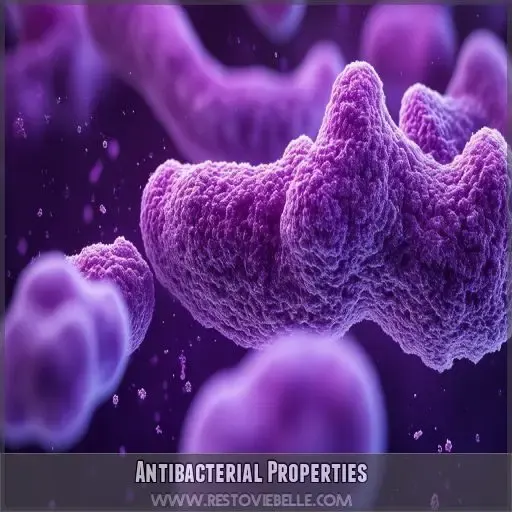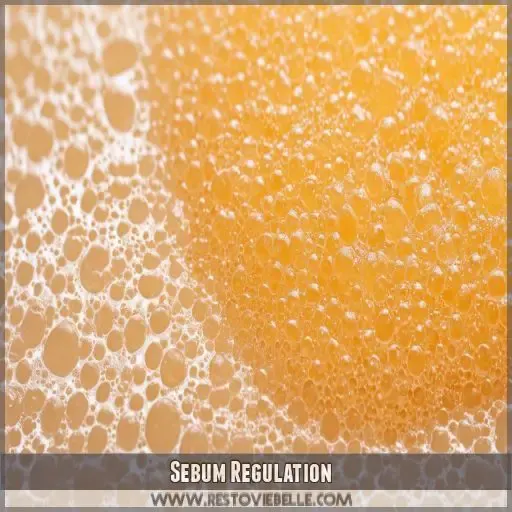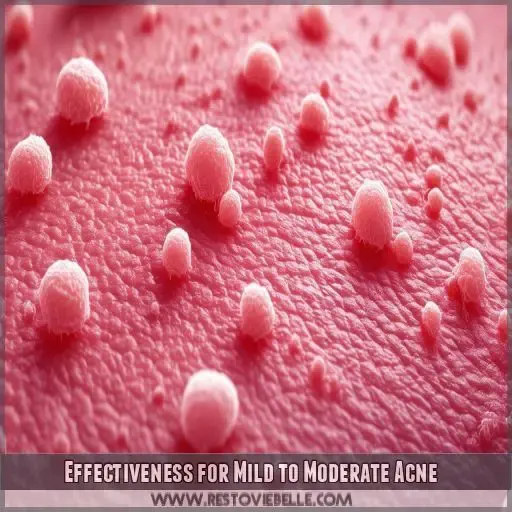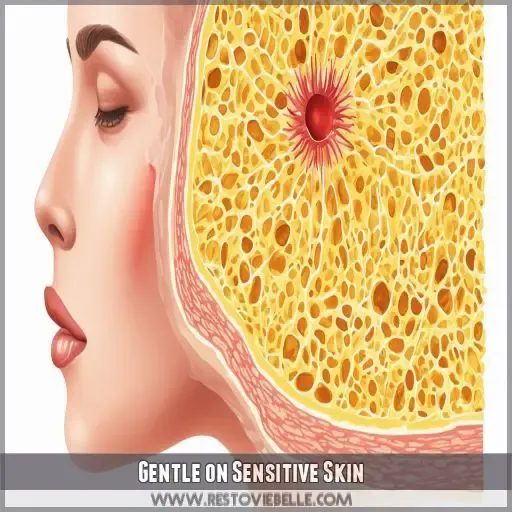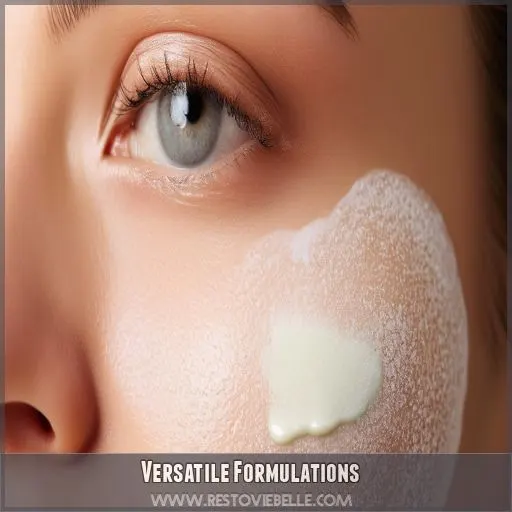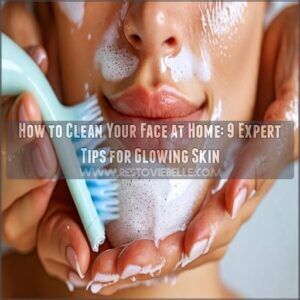This site is supported by our readers. We may earn a commission, at no cost to you, if you purchase through links.
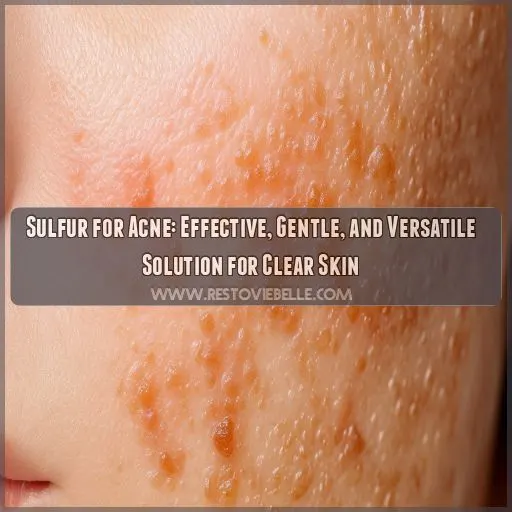 Interestingly, sulfur has been a trusted ally against acne through the ages. Its antibacterial feature makes it so efficient in an antibacterial fight with bacteria that cause acne.
Interestingly, sulfur has been a trusted ally against acne through the ages. Its antibacterial feature makes it so efficient in an antibacterial fight with bacteria that cause acne.
Sulfur’s keratolytic effects promote the shedding of skin cells or exfoliation in general and remove dead skin cells. Also, it maintains balanced sebum production, preventing excessive skin oiliness.
This versatile element is gentle on sensitive skin but effective for mild to moderate acne. Integrating sulfur into your skincare routine will clearly lead down a controlled path toward healthier skin.
Table Of Contents
- Key Takeaways
- How Does Sulfur Help With Acne?
- Antibacterial Properties
- Keratolytic Effects
- Sebum Regulation
- Effectiveness for Mild to Moderate Acne
- Gentle on Sensitive Skin
- Versatile Formulations
- Frequently Asked Questions (FAQs)
- Does sulfur get rid of acne?
- What does sulfur do to your face?
- How long to leave sulfur on acne?
- What not to mix with sulfur skincare?
- Does sulfur help acne?
- Can a sulfur face mask help with acne?
- What is sulfur used for in skincare?
- How long does sulfur take to work for acne?
- Can sulfur be used during pregnancy?
- Are there sulfur-free alternatives for acne?
- How long does sulfur treatment take?
- Will sulfur products bleach clothing?
- Does sulfur work for body acne?
- Conclusion
Key Takeaways
- Banish acne with sulfur, your trusty skincare ally! Its antibacterial powers take out the nasty bacteria causing those pesky breakouts.
- Sulfur is a gentle touch for sensitive skin, unlike some harsh acne treatments that leave your face feeling like a battlefield.
- Tired of clogged pores? Sulfur’s got your back! It exfoliates like a pro, clearing the way for smoother, clearer skin.
- Say goodbye to excess oil with sulfur’s oil-regulating magic. It’s like a mop for your skin, soaking up the extra oil that leads to breakouts.
How Does Sulfur Help With Acne?
Sulfur helps with acne by tackling multiple causes at once. It kills Propionibacterium acnes bacteria, which prevents infections. As a keratolytic, it exfoliates dead skin cells, reducing pore blockages.
Plus, sulfur regulates sebum production, controlling excess oil and preventing acne buildup. These properties make sulfur suitable for treating whiteheads, blackheads, and small pimples, especially in mild to moderate cases.
It’s gentle on sensitive skin and can be found in various formulations like cleansers and creams, making it easy to incorporate into your routine.
Curious about how sulfur fits into your skincare game? Stick around to find out more.
Antibacterial Properties
You can count on sulfur’s potent antibacterial properties to help fight acne-causing bacteria. This natural element is particularly effective against Propionibacterium acnes, the primary culprit behind breakouts.
Unlike some treatments, sulfur doesn’t promote resistance development, making it a reliable option. For best results, consider using sulfur in combination with other acne-fighting ingredients like benzoyl peroxide or sodium sulfacetamide.
Topical applications are the most common way to harness sulfur’s antibacterial benefits, but oral medications may also be an option for more stubborn cases.
Whether you have mild acne or a more persistent complexion concern, sulfur’s unique properties can help you achieve the clear, healthy skin you desire.
Keratolytic Effects
Sulfur has impressive keratolytic effects, which are vital in acne management. It’s a softener of the skin, thus allowing it to exfoliate and remove dead skin cells from the pores.
Keratolysis aims at enhancing the natural shedding of the skin to deter blockages that cause acne breakouts. It’s like gently sweeping all the junk out of the way to reveal newer skin underneath.
Additionally, this exfoliation gets the skin ready for the better absorbance of other skincare products. It’s like preparing a way for your skin treatments to work more effectively.
Thus, if you have acne-prone skin, then the keratolytic action performed by sulfur would be very instrumental in keeping your skin smooth and blemish-free.
Sebum Regulation
Sebum regulation forms a vital part of controlling acne, and in that respect, sulfur stands unparalleled. Due to its control over oil levels, sulfur leads to minimal pore blockage and reduces oiliness, which typically triggers breakouts.
The drying properties of sulfur help alleviate excess oils, thus preventing skin inflammation. However, over-drying may pose problems for individuals with sensitive skin. It is important to monitor the long-term effects and take appropriate measures to prevent skin irritation or further scarring from acne.
Gently working on the skin, sulfur helps balance oil levels to prevent the buildup of acne-causing bacteria. This makes sulfur oil control a reliable option without being too harsh on the delicate balance of your skin, unlike some other treatments.
Effectiveness for Mild to Moderate Acne
Sulfur works on mild to moderate acne, including whiteheads, blackheads, and small pimples. It has antibacterial properties against the bacteria that cause acne, keratolytic action for exfoliating and removing dead skin cells, and, at the same time, controls excess secretion of sebum, avoiding blocked pores.
- Mild to Moderate Acne: Covers most of the standard forms like whiteheads and blackheads.
- Seborrheic Dermatitis: Helps treat related skin conditions.
- Alternative Treatments: Compliments ingredients such as salicylic acid and benzoyl peroxide.
Patch testing is critical before using them longer to avoid any potential skin irritation. Sulfur gives a gentle approach compared to other treatments that don’t compromise effectiveness. Ensure following the dosage recommendations for effective results.
Gentle on Sensitive Skin
With sensitive skin, it can be quite a challenge to use acne treatments. Sulfur happens to be mild and causes very fewer side effects, which can include itching, redness, dryness, irritation, or peeling. This ingredient is gentle on the skin and won’t really disrupt its natural barrier that much. However, with any new skincare product introduced, patch testing is always best to ensure that one wouldn’t have a bad reaction to the ingredient. Just be wary that sulfur sometimes smells of rotten eggs, which can be repellent for some. Here is a fast breakdown:
| Benefit | Explanation |
|---|---|
| Gentle | Less likely to irritate sensitive skin |
| Antibacterial | It helps fight bacteria causing acne. |
Sulfur soothes your skin while it effectively combats acne.
Versatile Formulations
Sulfur’s versatility shines through the diverse range of formulations available. From cleansers and creams to exfoliants and face washes, you can find sulfur-infused products to suit your specific needs. This allows you to seamlessly incorporate sulfur into your existing skincare routine, whether you’re looking to target mild blemishes or address more stubborn breakouts.
The ability to combine sulfur with other acne-fighting ingredients, like salicylic acid or benzoyl peroxide, further enhances its effectiveness, enabling a more targeted and personalized treatment approach. And with sulfur’s long-term benefits, you can enjoy clearer, healthier skin over time. Embrace the power of this versatile ingredient and discover the perfect sulfur-based solution for your unique skin type and concerns.
Frequently Asked Questions (FAQs)
Does sulfur get rid of acne?
Yes, sulfur helps get rid of mild acne by killing bacteria, exfoliating dead skin cells, and controlling excess oil. It’s gentle on sensitive skin but may cause dryness, irritation, or redness, so use cautiously.
What does sulfur do to your face?
Sulfur exfoliates by softening keratin, unclogs pores, and kills acne-causing bacteria. It removes excess oils, preventing breakouts and is gentle enough for sensitive skin, making your face feel smoother and clearer with regular use.
How long to leave sulfur on acne?
Leave sulfur on acne for about 10-20 minutes, depending on product instructions. It’s best to start with a shorter duration and increase gradually if no irritation occurs. Always follow with a gentle moisturizer.
What not to mix with sulfur skincare?
Don’t mix sulfur skincare with retinoids, benzoyl peroxide, or salicylic acid. Combining can irritate your skin like adding fuel to a fire, leading to dryness, redness, and discomfort. Stick to one active ingredient for best results.
Does sulfur help acne?
Yes, sulfur helps treat acne by killing acne-causing bacteria, reducing oiliness, and exfoliating dead skin cells. It’s effective for mild acne, such as whiteheads and blackheads, and is gentle enough for sensitive skin.
Can a sulfur face mask help with acne?
Imagine sulfur as your skin’s cleanup crew, tackling acne by killing bacteria, removing dead skin cells, and absorbing excess oils. A sulfur face mask can effectively treat mild acne and improve your skin’s overall appearance.
What is sulfur used for in skincare?
Sulfur in skincare helps treat acne by killing bacteria, exfoliating dead skin cells, controlling oil production, and preventing clogged pores. It’s effective for mild acne and also benefits conditions like rosacea and seborrheic dermatitis.
How long does sulfur take to work for acne?
You’ll typically see improvements in mild acne within a few days to a week of using sulfur-based products. However, results can vary depending on your skin type and the severity of the acne.
Can sulfur be used during pregnancy?
Yes, you can use sulfur during pregnancy; however, consult your healthcare professional first. Generally, it’s considered safe to apply sulfur during pregnancy, but skin sensitivities and individual conditions may vary. Always do a patch test to ensure there are no adverse reactions to occur.
Are there sulfur-free alternatives for acne?
Yes, sulfur-free alternatives for acne include salicylic acid and benzoyl peroxide. Salicylic acid exfoliates and unclogs pores, while benzoyl peroxide kills acne-causing bacteria and reduces inflammation. Both are effective and widely used.
How long does sulfur treatment take?
Sulfur treatment for acne typically shows results in about 4-6 weeks. You’ll notice reduced inflammation and fewer breakouts as it kills bacteria, unclogs pores, and controls excess oil, promoting clearer skin.
Will sulfur products bleach clothing?
Sulfur products can potentially bleach clothing due to their drying and exfoliating properties. You should be cautious when using them, particularly with fabrics, to prevent any unwanted discoloration or damage to your clothes.
Does sulfur work for body acne?
Using sulfur for body acne is like bringing a mop to spilled milk; it cleans effectively. Sulfur’s antibacterial and keratolytic properties help to clear away bacteria and dead skin, reducing breakouts on your body.
Conclusion
Imagine finally getting that clear skin; sulfur may be a real find.
How does sulfur work for acne? It kills bacteria, increases exfoliation, and regulates oil production within the skin. This just might be the thing to get you through your mild to medium acne with its gentle action that soothes and doesn’t irritate sensitive skin.
Putting sulfur into your skincare will help you achieve cleaner and healthier skin. With the various formulations available in the market, you’re guaranteed to get one that best fits your needs.
Unleash the power of sulfur for optimal skin health.

